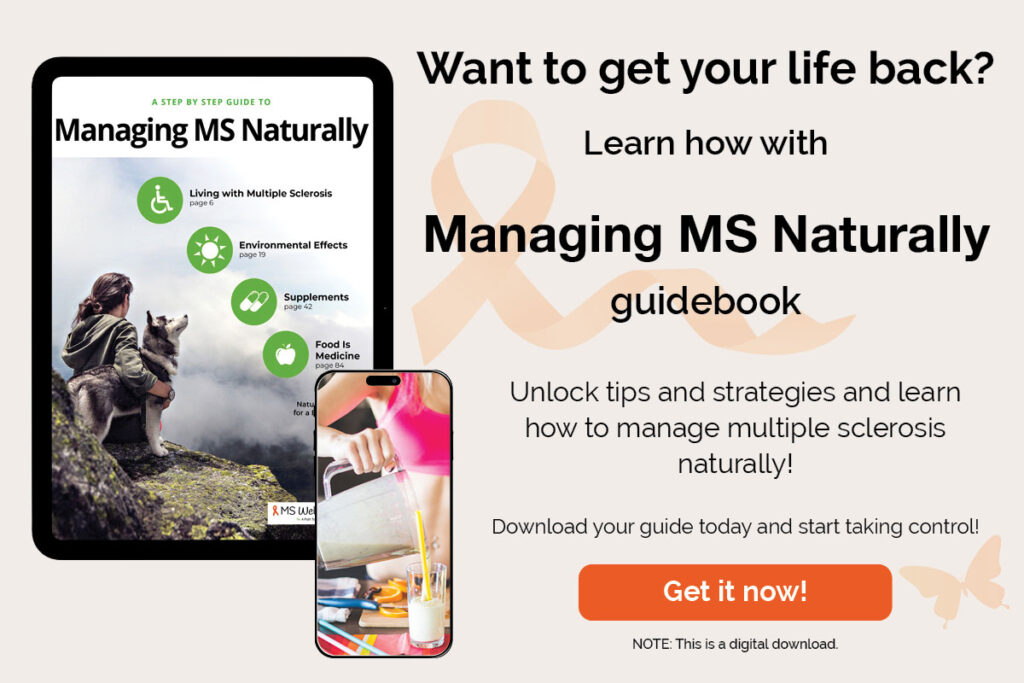
Imagine waking up one day, and everything feels different. Your body’s not responding the way it used to, your mind’s in a fog, and you can’t help but feel trapped in a body that’s suddenly unpredictable. Does this sound familiar?
However, you’re not alone in this battle. When I was 15 years old, I noticed that I couldn’t see out of my left eye. After visiting an ophthalmologist, he diagnosed me with optic neuritis. He also told me, “You could have multiple sclerosis (MS) someday.” Unfortunately, he was right.
Living with MS is depressing and frustrating, it’s also a constant struggle. It is considered one of the worst autoimmune diseases to have. It is a debilitating disease that leads to many neurological symptoms. But here’s the thing: it doesn’t have to stay that way.
Ever find yourself thinking, “Why me?” or worrying about what tomorrow might bring? That frustration is real. It’s heavy, it’s exhausting, and it’s valid. I know; I’ve been there.
It’s easy to feel like you’re at the mercy of something out of your control, and frankly, it sucks. You might be thinking that there has to be a way out, a way to reclaim your life, and you’re right to feel that way. No one should have to settle for a life half-lived.
Healing your CNS isn’t just a dream. It’s possible, and it starts with understanding that your body can do incredible things. Think of your nervous system as a garden. Sometimes, it gets overrun with weeds, but with the right care, it can flourish again. It’s about finding the right tools, nurturing the soil, and giving it time.
Live A Holistic Lifestyle

Image by chandlervid85 on Freepik
Living a holistic lifestyle means healing your central nervous system (CNS) naturally. It’s an approach that treats your body as a whole, not just a set of symptoms. It’s not only your CNS; it’s a combination of your body, spirit, and mind. If you believe you can’t get better, chances are you won’t.
First Up, Nutrition:
Food is powerful. Think of it as fuel for your healing journey. Loading up on anti-inflammatory foods can make a world of difference. You need to cut out heavily processed foods. It’s tough but worth it. Imagine your body as a machine—give it premium fuel, and it’ll run smoother.
Foods to avoid include:
- Dairy (causes MS symptoms)
- Gluten (creates inflammation)
- Refined sugar
- Artificial flavors and sweeteners
- Natural flavors
- Corn (it’s mostly a GMO)
- Soy (it’s mostly a GMO)
- MSG (harms the brain and CNS)
- Nutritional yeast (it has MSG in it)
- Canola oil (it’s mostly a GMO)
- Pork (it’s high in fat and prone to parasites)
- Farmed fish (it’s washed in toxic chemicals due to parasites)
- Eggs – both the McDougall Diet and The Wahls Protocol recommend avoiding eggs
- Processed citric acid (it’s mostly derived from corn)

Next, Movement:
Not just any movement, though—gentle, mindful exercise. Yoga and tai chi can help you connect with your body, easing stiffness and reducing stress. Even short, daily walks can boost your mood and energy levels. It’s about finding what feels right for you and sticking with it. Small steps, big impact.
I use two different exercises. One is a vibration plate to help get my lymphatic system moving. A mini trampoline is another good option. If you have balance issues, have something sturdy to hold on to. The second exercise I use is an online gym called OptimalBody Personal Fitness. David Lyons, the owner, also has MS so he knows which exercises work! It’s for all levels of MS, including people in wheelchairs.
Let’s Talk About Stress:
Chronic stress is like poison for your nervous system. Mindfulness and meditation are your best friends here. They’re not just buzzwords—they really work. Even just a few minutes of deep breathing each day can help calm your mind and body. Think of it as hitting the reset button.
Don’t Forget About Sleep:
Quality sleep is non-negotiable. Create a bedtime routine that signals your body it’s time to wind down. No screens, a good book, and maybe some calming herbal tea. Your nervous system repairs itself while you sleep, so make it a priority.
Lastly, Community:
Surround yourself with people who lift you up. Sharing your journey with supportive friends and family can lighten the load. Sometimes, just knowing someone’s got your back can make all the difference.
Stay Hydrated

This next part should be easy, but it can be a real struggle. Dealing with bladder issues makes it tricky. Staying hydrated is crucial, but it’s tough when you’re worried about bathroom breaks. It’s a balancing act—drinking enough without overloading your bladder. Don’t let this challenge discourage you. With some planning, you can find a rhythm that works. Remember, every sip is a step towards better health. Keep going; you’ve got this!
It’s something we all take for granted: water. Drinking enough water is crucial for healing your CNS. It’s one of the simplest, yet most powerful things you can do for your body. Drink filtered water to avoid chemicals, heavy metals, and pharmaceuticals.
Think about it. Your body is like a sponge. When it’s dry, nothing works quite right. When you’re hydrated, everything runs smoother. Your cells, your organs, your brain—they all need water to function properly. But not just any water. Filtered water. It’s clean, and free of impurities, and it’s what your body craves.
Dehydration can be sneaky. It can make you feel sluggish, foggy, and just off. Ever have one of those days where you can’t think straight, and your energy’s in the gutter? Sometimes, it’s as simple as needing more water. And for those of us with MS, staying hydrated can help reduce fatigue and support nerve function.
Every day, I wear Taopatches. They’re tiny disk-shaped devices, packed with nanotechnology. These little wonders use light therapy and acupuncture to perk up the CNS. They’re like messengers, improving communication between different parts of your body’s nervous system.
For folks with MS like me, Taopatches are a game-changer. They help tame symptoms like fatigue, spasticity, and pain. But here’s the kicker: if I forget to drink enough water while wearing them, I feel it. My legs just won’t lift as high. It’s like they need that hydration boost to do their magic.
Here is a video of when I first put them on:
So, how much is enough? Aim for at least eight glasses a day, but listen to your body. If you’re thirsty, drink. If your urine is dark, drink more. Keep a water bottle with you, and make it a habit to sip throughout the day. You might be surprised how much better you feel.
Keep track of how much you drink in one day, you might be surprised. Write it down and keep it on your refrigerator or use an app on your smartphone.
Filtered water doesn’t just hydrate. It flushes out toxins, supports digestion, and keeps your skin glowing. It’s like giving your insides a refreshing shower. Your nervous system will thank you.
Staying hydrated might seem like a small step, but it’s a big deal. It’s one more way to take control and support your healing journey. Ready to raise a glass to better health? Cheers to that!
Follow Through On These Tips
You’ve already taken some crucial steps, but there’s always more you can do to support your body’s natural healing abilities. Below are additional tips designed to help heal your central nervous system.
To heal your central nervous system, start by incorporating anti-inflammatory foods into your diet, then add these to your lifestyle:
- Gentle exercises like yoga
- Drinking plenty of filtered water
- Meditation and mindfulness
- Quality sleep is crucial if you want to heal
- Surrounding yourself with supportive people can aid in your efforts to heal
- Avoiding processed foods can help
- Regular, mindful movement can play a big role
- Reducing chronic stress is a key step
Healing your central nervous system involves a holistic approach, addressing both body and mind. First and foremost, it’s essential to recognize that physical health and mental well-being are deeply interconnected. Focusing solely on one aspect while neglecting the other can hinder your progress. Therefore, incorporating balanced nutrition and regular physical activity is important.
Simultaneously, practicing mindfulness and stress reduction techniques can significantly improve your mental resilience. Moreover, ensuring quality sleep and hydration supports overall bodily functions. A complete plan that includes these steps can help your central nervous system heal.
Healing Powers

Healing your central nervous system is a journey, not a sprint. It’s about making small, consistent changes that add up over time. Embrace a holistic approach—eat nourishing foods, stay active with gentle exercises, manage stress with mindfulness, ensure quality sleep, and hydrate well with filtered water. Each step you take brings you closer to a healthier, more vibrant life.
To heal your central nervous system, you need to embrace a well-rounded approach that supports both your body and mind. Remember, you’re not alone in this. Surround yourself with a supportive community. Share your highs and lows, and let others lift you up when you need it. Your body has an incredible ability to heal and adapt. By giving it the right tools and environment, you’re setting yourself up for success.
Stay patient and kind to yourself. There will be days when it feels hard, and that’s okay. Celebrate small victories, and keep moving forward. Healing is a process, and every positive choice you make contributes to your overall well-being. That includes thinking positive thoughts!
So, let’s take this journey together. Let’s commit to these small, powerful changes. Your central nervous system can thrive, and so can you. You can do it!
Quick Links To Information In This Post:


Want to remember this health tip? Pin it to your Pinterest board!

How To Heal Your Central Nervous System





